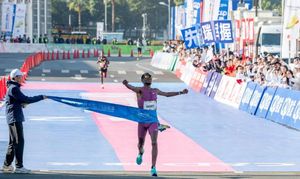American comedian Akaash Singh has stepped forward to support Indian comedians Ranveer Allahbadia and Samay Raina amid the controversy surrounding their show, India's Got Latent. The two faced immense backlash after comments made during the show ignited outrage and resulted in serious repercussions, including police complaints and Supreme Court orders.
Singh took to social media to express his concerns, vocally criticizing the silence of Indian-American public figures. He remarked, "Not a single Indian-American actor, podcaster, or stand-up comic has spoken up about what's happening with Ranveer and Samay." Inferring the motives behind this silence, Singh noted, "This won’t get you invited to a Diwali party or land you a TV role, but this is the only time you can actually make a difference.”
On his podcast, he elaborated on his stance, reflecting on the roots of the controversy and explaining his hesitation to perform comedy shows back home. The backlash against Allahbadia and Raina originated from comments made by Allahbadia about parents and sex on Raina's platform. The episode sparked significant online outrage, prompting death threats and formal complaints against the pair. Following the incident, both comedians offered public apologies.
Since the controversy erupted, Raina has taken down all episodes of India's Got Latent from YouTube, aiming to quell the backlash and damage done. Yet the debate continues, with observers noting the intersection of free speech, content creation, and cultural sensitivities within Indian society.
Social media responses to Singh's comments have been divided. Some users found solidarity with his viewpoint, expressing frustration over the lack of action among Indian-Americans concerning issues like this. Influencer Seema Anand commented, "People are outraged over this, but never raise their voices against real issues like violence and assault."
Others, including radio personality RJ Malishka, added to the discussion by saying, "You never know when the mob decides to target you. Until then, we all take our chances." The online community remains polarized, with one user thanking Singh for his outspokenness, saying, "So preposterous, thank you for speaking up," indicating appreciation for his stance.
Opposition did arise as well, especially from users debating Singh's credibility as someone who doesn’t reside in India. One critic remarked, "Just because he’s defending them in an American accent doesn’t mean they were right," highlighting the tension between those living abroad and the realities faced by those on the ground. Such reactions speak to the complex dynamics of cultural representation and advocacy across borders.
The controversy also raises pertinent questions around content modification and the limits of acceptable speech, especially as it pertains to comedy. Singh’s comments have compelled broader discussions on the role of comedians and entertainers when discussing sensitive topics.
Despite the backlash and the apologies issued, opinions vary widely on whether opinions expressed on platforms like India's Got Latent should be shielded under freedom of expression. India has seen significant restrictions related to various forms of artistic expression, which raises broader issues about censorship and the potential dangers faced by creators expressing their ideas.
This discourse continues to evolve as more individuals contribute publicly to the conversation, urging the audience to reflect critically on freedom of expression, accountability, and the responsibilities borne by public figures.



